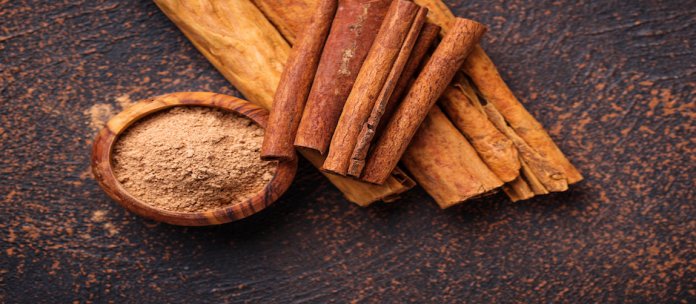There is a “lazy susan” on my kitchen counter that is loaded with herbs and spices. They’re all in jars of varying shapes and sizes, and I use them often enough to be able to recognize each one without looking at the label. The largest container of them all is a one pound jar of Ceylon cinnamon. It’s the easiest one to find, and that’s a good thing– because we use it so often. In the article below, my team at UpWellness reveals the secrets of this remarkable spice and why it should be a staple in your kitchen too. With that, I have two requests: First, read and enjoy the article below. And then, find a way to add some cinnamon to your day today.
Enjoy!
-JL
Before we can get into a discussion about cinnamon and its healing properties it is essential to clarify what you might think is cinnamon and what really is cinnamon.
Most people are familiar with cassia or “bastard cinnamon.” This type of cinnamon comes from China, Vietnam, Japan, Indonesia, and Korea. However, this type of cinnamon is not regarded as true cinnamon.
A type of cinnamon that comes from Sri Lanka, India, Brazil, Madagascar, and the Caribbean is referred to as true cinnamon. This cinnamon, known as Ceylon cinnamon, is quite often more expensive than cassia cinnamon. It also has a distinctive taste and is lighter in color and has a much smoother texture than cassia.
Cassia cinnamon contains a toxic ingredient
Another important distinction is that cassia cinnamon contains quite a bit of the compound coumarin which can be toxic in large amounts. Cassia cinnamon contains 1% coumarin while Ceylon cinnamon contains 250 times less at 0.004%. In fact, this amount it is barely traceable.
Coumarin has been found to cause kidney, liver and lung damage in rodents and may also cause cancer. There have even been similar effects seen in humans. The tolerable daily intake ( TDI) of coumarin has been reduced from 0.2mg/lb of body weight to 0.05mb/lb of body weight. Keep in mind that 1-2 teaspoons of cassia cinnamon can put you above that safe daily limit.
Health benefits of Ceylon cinnamon
Anti-inflammatory
Ceylon cinnamon has powerful anti-inflammatory properties that help to keep serious medical conditions such as diabetes, heart disease and even cancer at bay. Reducing chronic inflammation in the body also benefits overall health and wellbeing.
Treatment for diabetes
Research favors cinnamon as an alternative treatment of diabetes mellitus. It appears as though a compound in cinnamon mimics insulin and helps the cells take in glucose after a meal which significantly reduces the amount of glucose in the bloodstream. In one study it was found that cinnamon increased insulin for of up to 12 hours after consumption.
Cinnamon also gets in the way of digestive enzymes and slows the rate at which they gobble up carbohydrates, thus moderating the impact of glucose.
Blood pressure regulator
Cinnamon contains a compound called cinnamic acid that has potent anti-inflammatory properties that improve blood flow throughout the body reducing strain on the heart.
Research supporting the use of Ceylon cinnamon to help with blood pressure has existed since 1975 and promotes the use of Ceylon cinnamon for healthy cardiovascular function.
Bacterial infections
Cinnamon contains cinnamaldehyde which helps inhibit the growth of bacteria including Salmonella and Listeria. Cinnamon oil has been used to successfully treat infections in the respiratory tract caused by fungi. A popular ingredient in toothpaste, cinnamon may also help squash bad breath and prevent tooth decay.
Neurological prevention
There is a strong connection between Alzheimer’s disease and diabetes. When blood sugar in the brain is too high it can trigger cognitive decline/ Cinnamon keeps blood sugar from rising too fast, thus protecting the brain. Researchers think Ceylon cinnamon to be helpful for and even prevent neurological conditions such as Alzheimer’s disease. Furthermore, two compounds found in cinnamon inhibit the buildup of a particular protein that is one of the hallmarks of Alzheimer’s disease.
An animal study done on mice with Parkinson’s disease demonstrated that cinnamon had was able to protect neurons, normalize neurotransmitter levels and improve motor function.
Eat More Cinnamon
Once you get your hands on some Ceylon cinnamon, there is no going back. You will notice a difference in texture, taste, and quality right away. Trust me; it is well worth the extra money. Here are some great ways to get more cinnamon in your diet.
- Add cinnamon to your coffee or hot chocolate
- Add cinnamon to chili
- Top your favorite organic granola with cinnamon
- Sprinkle cinnamon on yogurt
- Add cinnamon to your smoothies
- Add cinnamon to soups and stews
- Use cinnamon in healthy baking
My Favorite Cinnamon Recipe
Here is my favorite healthy cinnamon recipe.
Ingredients
- 3 medium-sized (Granny Smith apples are best)
- 1/2 cup coconut crystals
- 1 teaspoon cinnamon
How to make them
- Preheat oven to 200°F.
- Cut apples into thin slices. Be sure they are thin, or they won’t get crispy.
- Arrange slices on a baking sheet.
- Combine the sugar and cinnamon and sprinkle half over the apples.
- Bake apples for 1 hour.
- Turn apples over and sprinkle the other half of the sugar and cinnamon.
- Bake apples for another hour. Let cool.
Yummy!


